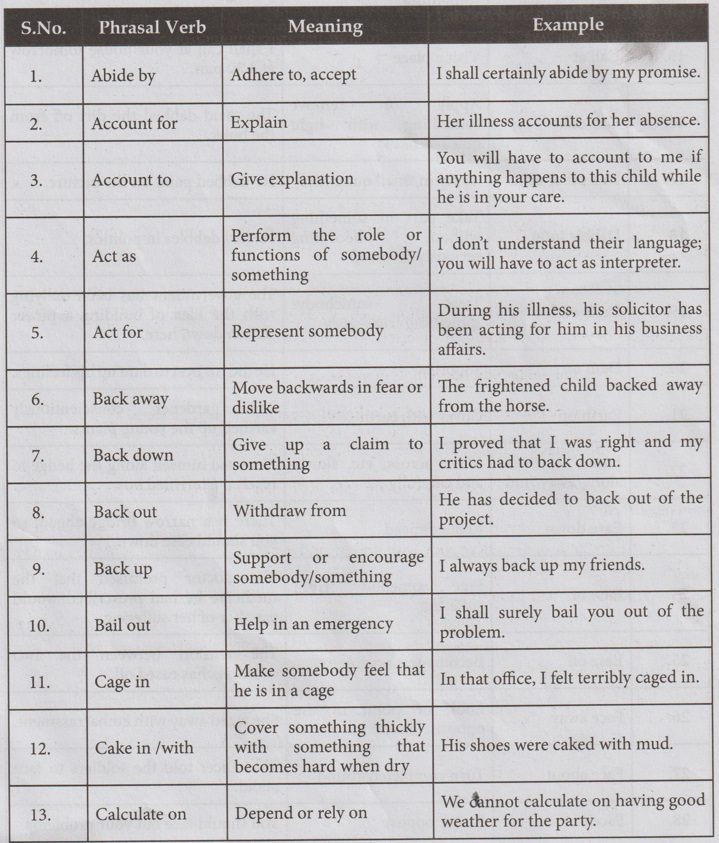Professional English I: Skill 2: Introduction to Effective Communication: Vocabulary
Phrasal Verbs
Vocabulary | Professional English
Phrasal verbs are combinations of a verb and a particle that, together, give you single, independent unit of meaning.
Topic – 5 PHRASAL VERBS Phrasal verbs are combinations of a verb and a particle that, together, give you single, independent unit of meaning. For example 'The wedding was put off until January' means it was postponed and ‘Anita turned up at the party with a friend' means that she arrived with a friend. You can form many phrasal verbs by adding different particles to the same verb, for example ‘cut off, cut into, 'cut out, cut through, “cut up’. The particle in a phrasal verb is either a preposition, such as 'in' or 'on, or an adverb, such as ‘up' or 'out' or an adverb and a preposition, such as 'out of'. Look at the pairs of sentences below for examples of verbs followed by an adverb or preposition and of phrasal verbs. She ran out to play. (used in its literal sense of verb + adverb) He came into the room. (used in its literal sense of verb + preposition) She ran out of sugar. (phr. Verb meaning ‘not have enough of something') He came into some money recently. (phr. verb meaning 'to get money / property after someone's death') In the first pair of sentences above, we understand run out and come into' by combining the meanings of the two words. But it is not possible to do this with the phrasal verbs in the second pair, and we will have to look up their meanings, which are idiomatic, in a dictionary. Phrasal verbs—which are sometimes less formal than a single verb (e.g. 'put off' for 'postpone' and turn up for ‘arrive') and also more economical than longer expressions (e.g. 'look up to’ for 'admire and respect someone' and 'talk down' for 'talk to someone as if they were less clever than you')—therefore need special attention when you are building your vocabulary in English. Look at some examples of currently used phrasal verbs. Note their meanings and how they are used in sentences. I. Replace the bold word in the sentence with one of the phrasal verbs given below to convey the same meaning. 1. You are inviting trouble if you quarrel with the house owner. a. asking after b. asking for c. asking on d. ask against 2. He promised to contribute towards the fund but later withdrew. a. backed out b. backed on c. backed away d. backed off 3. I am depending on the loan for my higher education. a. banking up b. banking away c. banking on d. banking off 4. I was surprised when I won the lottery. a. taken on b. taken of c. taken away d. taken aback 5. Modern researches prove that yoga cures diseases. a. bear out b. bear down c. bear up d. bear off 6. Please tolerate the pain. a. bear out b. bear down c. bear with d. bear off 7. Shyla is determined to become a lawyer. a. bent upon b. bent over c. bent at d. bent on 8. Your troubles will soon end when your father returns from abroad. a. blow over b . blow out c. blow up d. blow away 9. You will suffer if you drink. a. break up b. break down c. break off d. break away 10. A few under trials escaped from prison last night. a. broke off b. broke away c. broke in d. broke out 11. Your negligence has caused this great loss. a. brought in b. brought out c. brought about d. brought round 12. The incident has exposed the victimization of women. a. brought out b. brought by c. brought round d. brought up 13. Our parents have raised us to be good citizens. a. brought round b. brought aside c. brought up d. brought about 14. Through perseverance and hard work, he developed his business. a. brushed up b. broke up c. built up d. carried up 15. His crimes deserve a severe punishment. a. call about b. call for c. call in d. call out 16. Whenever you need help you can visit me at any time. a. call at b. call on c. call for d. call in 17. Many people pray to god for help rather than for thanking him. a. call upon b. call at c. call on d. call about 18. We must obey his orders. a. carry off b. carry on c. carry away d. carry out 19. Now that winter is over, we can remove the woolen clothes. a. cast up b. cast away c. cast down d. cast off 20. Naturopathy is a popularity now. a. catching out b. catching on c. catching off d. catching away 21. The violence started through a small quarrel. a. came on b. came off c. came about d. came along 22. When I was searching my drawer, I saw an old photograph. a. came on b. came by c. came to d. came across 23. The nib of my pen separated when I opened the cap. a. came out b. came off c. came away d. came down 24. A career woman has to manage with her family and office work. a. cope up with b. cope up c. cope with d. cope on 25. I can't trust my brother for any help. a. count out b. count by c. count down d. count on 26. Many problems arose when I started on a new business. a. came up b. cropped up c. built up d. brought up 27. Every alternate Saturday, power supply will be stopped for seven hours. a. cut up b. cut off c. cut away d. cut down 28. As soon as she saw the handbag, my sister was attracted to it. a. fell on b. fell by c. fell off d. fell for 29. Rajesh's plan failed. a. fell through b. fell off c. fell for d. fell away 30. Guru's income is small, but his family somehow manages. a. gets off b. gets along c. fell for d. fell away 31. Raju has not overcome his grief. a. got on b. got back c. got over d. got by 32. The salesman somehow persuaded the lady to buy the perfume. a. got along b. got off c. got over d. got around 33. Radium emits light. a. gives in b. gives up c. gives off d. gives out 34. Abandon smoking. a. give to b. give in c. give out d. give up 35. Don't trust my watch; it's always slow. a. go by b. go in for c. go ahead d. go out 36. The Inspector promised to examine the report. a. go without b. go through c. go on d. go off 37. Wait for a moment. a. Hold up b. Hold by c. Hold off d. Hold on 38. We must avoid any bags or parcels in public places. They may be explosives. a. keep out b. keep off c. keep on d. keep by 39. Cats drink milk and eat fish. a. live by b. live off c. live at d. live on 40. The children watched the peacock in wonder. a. looked for b. looked on c. looked at d. looked onto 41. Raghul is searching for his key. a. looking for b. looking on c. looking out d. looking into 42. Kishore accepted his fault. a. made up b. owned up c. took up d. looked up 43. I selected a red gown for the party. a. picked on b. picked off c. picked out d. picked away 44. We had to stop seeing the red signal. a. pull up b. pull aside c. pull down d. pull through 45. Save your energy for the final match. a. set in b. set apart c. set off d. set up 46. The Olive branch represents peace. a. stands by b. stands in c. stands for d. stands up 47. My sister resembles my mother. a. takes up b. takes for c. takes on d. takes after 48. The pain will decrease gradually. a. wear in b. wear out c. Wear off d. wear away 49. We ended the party at 9 p.m. a. wound in b. wound up c. bring in d. bring on 50. The speeding jeep ignored the traffic signal. a. winked at b. looked at c. winked up d. looked off II. Complete each sentence with an appropriate phrasal verb. The meaning of the phrasal verb to be used is given in brackets. Example She _______ her old umbrella. (got rid of) She threw away her old umbrella. 1. They _______ the strike last night. (cancelled) 2. You can _______ the work here. (continue) 3. She _______ an old photograph. (found by chance) 4. I don't _______ fish and meat. (like) 5. She _______ four children. (raised) 6. They came and _______ the manager. (wanted to speak to) 7. Nothing will _______ the meeting. (happen as a result) 8. Please _______ this form. (complete) 9. I _______ the bus and walked a short distance. (left) 10. Have you _______ your cold? (got well again) _ 11. How can I _______ all this work today? (finish) 12. He _______ the money he borrowed. (returned) 13. I _______ the bus, but it broke down soon. (entered) 14. The handle of the kettle _______ (was separated) 15. I _______ the principal in the morning. (visited) 16. The war _______ a lot of changes. (caused) 17. We have agreed to all the conditions. We can't _______ now. 18. I _______ smoking long ago. (stopped) 19. Please _______ I'll find out the number. (wait) 20. Don't _______ any important point. (omit) 21. He promised to come, but he didn't _______ (appear) 22. We must _______ the problem. (study) 23. Who is _______ the children in their parents' absence? (taking care of) 24. The children are _______ the holidays. (expecting with pleasure) 25. We shouldn't _______ these threats. (yield to or give way to) 26. He ran so fast that I couldn't _______ him. (reach) 27. _______ the flowers you want. (choose) 28. I couldn't _______ if she liked him or not. (understand) 29. We must _______ the doctor immediately. (call) 30. Mini _______ her mother. (looks like) 31. The teacher _______ all the errors in the answer. (showed) 32. His application was _______ (not accepted) 33. Would you mind _______ the radio? (reducing the volume) 34. I hope everything will _______ well. (develop in successful way) 35. He _______ his shirt before he jumped into the water. (removed) 36. The eldest son _______ the family business. (got control of) 37. The man is _______ a new job. (trying to find) 38. She ______ a story for the children. (invented) 39. His ways are so strange that we find it difficult to ______ him. (tolerate or accept) 40. The committee ______ a new plan for the reorganization of the party. (proposed)INTRODUCTION


Practice Exercises
Professional English I: Skill 2: Introduction to Effective Communication: Vocabulary : Tag: : Vocabulary | Professional English - Phrasal Verbs
Related Topics
Related Subjects
Professional English I
HS3151 1st semester | 2021 Regulation | 1st Semester Common to all Dept 2021 Regulation
